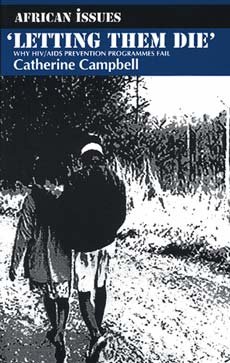Description
Letting Them Die
Today in South Africa, HIV/AIDS kills about 5 in 10 young people. Many of the victims are miners and commercial sex workers who ply their trade in mining communities.
In this critique of government-sponsored and privately funded HIV/AIDS prevention programs in South Africa, Catherine Campbell exposes why it has been so difficult to stop the HIV/AIDS epidemic.
Campbell’s research focuses on local vectors of the disease such as what people believe about the spread and prevention of AIDS, what measures they take to prevent disease, and whether they are likely to seek treatment at local AIDS clinics.
“Letting Them Die” is not just an investigation into sexuality, social relations, health, and medicine; it is also a sharp review of the kinds of programs that are becoming the standard method of HIV/AIDS intervention throughout Africa.
. . . of universal interest . . . a guidebook for anyone running or working in a health related programme in a developing country . . .” —African Review of Books
“A remarkable book . . . a signal example of why Campbell is considered one of the foremost researchers on HIV and AIDS. It is trenchant, troubling, meticulously reasoned and compellingly written.” — New England Journal of Medicine
“The book is a major achievement, setting the standard for rigorous evaluation of planning and delivering HIV prevention. It should be required reading . . . for all interested in developing or evaluating social interventions to promote health.” —Health Education Research
“This is a splendid and courageous book. . . . Tidily organised, properly directed and well-written. It will be significant reading for health and AIDS activists, those involved in development studies and social theorists of various stripes.” —Journal of Health Psychology
“A superb ethnography of a leading HIV/AIDS prevention programme . . . There is an honesty in Campbell’s writing that makes uncomfortable reading” —New Political Economy
“Brave, frank, perceptive . . . a uniquely detailed description and interpretation.” —Population and Development Review
“Arguably the most important practitioner critique to have appeared in recent years . . . a landmark book. . . . I salute the author’s intellectual honesty.” —Anthropology in Action
“An important and compelling contribution to the field of public health education . . . recommended to all those interested in finding ways of addressing the basic issues of health care inequality and social injustice through community education and organisation” —Health Education and Behavior
“A compelling demonstration of the value and power of qualitative research and process evaluation . . . intriguing and important . . . provides an inspiring intervention paradigm.” —Journal of Community and Applied Social Psychology
“A superb analysis of community development initiatives . . . well researched, intelligently summarised, and riveting . . . an important and compelling contribution.” —European Journal of Development Research.
 العربية
العربية  English
English 




